
 |
|
Million Dollar Baby (2004) Cast: Clint Eastwood, Hilary Swank, Morgan Freeman, Jay Baruchel, Mike Colter, Anthony Mackie, Brian O'Byrne, Margo Martindale, Riki Lindhome, Lucia Rijker, Michael Pena, Bruce MacVittie 2004 – 138 minutes Rated: Reviewed by Dustin Putman, December 9, 2004.  Director Clint Eastwood may have received acclaim with 2003's grotesquely overrated "Mystic River," but said accolades have turned out to be premature. His latest motion picture, "Million Dollar Baby," is his most complete and compelling achievement of the last decade, a wrenching, exquisitely acted drama set in the world of boxing that, thematically, has nothing to do with the sport. Based on a collection of short stories called "Rope Burns," by F.X. Toole, Eastwood and screenwriter Paul Haggis set their film up as a standard, albeit superior, sports tale in the first two-thirds, only to eclipse all possible expectations with a stunner of a plot development that goes the way of unconventionality and deepens what has come before. "Million Dollar Baby" may not turn out to be what people are anticipating, but that is an attribute for anyone tired of the same old thing. Certainly, it is difficult to imagine any viewer walking away untouched.
Director Clint Eastwood may have received acclaim with 2003's grotesquely overrated "Mystic River," but said accolades have turned out to be premature. His latest motion picture, "Million Dollar Baby," is his most complete and compelling achievement of the last decade, a wrenching, exquisitely acted drama set in the world of boxing that, thematically, has nothing to do with the sport. Based on a collection of short stories called "Rope Burns," by F.X. Toole, Eastwood and screenwriter Paul Haggis set their film up as a standard, albeit superior, sports tale in the first two-thirds, only to eclipse all possible expectations with a stunner of a plot development that goes the way of unconventionality and deepens what has come before. "Million Dollar Baby" may not turn out to be what people are anticipating, but that is an attribute for anyone tired of the same old thing. Certainly, it is difficult to imagine any viewer walking away untouched.
 Frankie Dunn (Clint Eastwood) is a grizzled, long-time boxing trainer carrying a lot of heavy baggage from his past, including the mysterious circumstances that led to his estrangement from his grown daughter. Attending Mass every day even as he questions what is being taught by Father Horvak (Brian O'Byrne), Frankie suddenly finds himself without a prized boxer when Big Willie Little (Mike Colter) hires another trainer more willing to take him to the top. With an open slot and free time on his hands, Frankie begrudgingly agrees to take on Maggie Fitzgerald (Hilary Swank), a poor Southern-born waitress who may be past her prime at 31 years of age, but more than makes up for it with an ambitious, unflagging "never-give-up" attitude. Having always dreamed of rising above her lowly background and becoming a star boxer, Maggie soon rises to the top with Frankie's knowledgeable training and growing friendship, her undefeated reign sending them around the world as she fights the nation's most fierce female boxers.
Frankie Dunn (Clint Eastwood) is a grizzled, long-time boxing trainer carrying a lot of heavy baggage from his past, including the mysterious circumstances that led to his estrangement from his grown daughter. Attending Mass every day even as he questions what is being taught by Father Horvak (Brian O'Byrne), Frankie suddenly finds himself without a prized boxer when Big Willie Little (Mike Colter) hires another trainer more willing to take him to the top. With an open slot and free time on his hands, Frankie begrudgingly agrees to take on Maggie Fitzgerald (Hilary Swank), a poor Southern-born waitress who may be past her prime at 31 years of age, but more than makes up for it with an ambitious, unflagging "never-give-up" attitude. Having always dreamed of rising above her lowly background and becoming a star boxer, Maggie soon rises to the top with Frankie's knowledgeable training and growing friendship, her undefeated reign sending them around the world as she fights the nation's most fierce female boxers.
 Where "Million Dollar Baby" leads next, it dare not be mentioned, except to say that the film diverts predictability and general sports clichés for something much more weighty, human, and, ultimately, tragically uplifting. How refreshing it is to witness a movie within the tried-and-true genre that doesn't end with a championship fight, nor has to rely on such to garner audience interest. Furthermore, although Maggie does raise herself to victory at a certain point, that is hardly the film's point or its purpose.
Where "Million Dollar Baby" leads next, it dare not be mentioned, except to say that the film diverts predictability and general sports clichés for something much more weighty, human, and, ultimately, tragically uplifting. How refreshing it is to witness a movie within the tried-and-true genre that doesn't end with a championship fight, nor has to rely on such to garner audience interest. Furthermore, although Maggie does raise herself to victory at a certain point, that is hardly the film's point or its purpose.
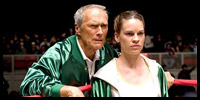 Essentially, "Million Dollar Baby" is the story of a man in search of the acceptance of his daughter and a young woman without a father who are brought together just when they need a connection most, forming a close relationship more powerfully symbolic than that of student and mentor. Boxing happens to be the sport that brings these two lonely souls together, and the plentiful matches depicted are vibrantly charged with intense spontaneity and energy, but it is little more than window dressing leading to the larger central conflicts. Filmed in a minimalist style by director Clint Eastwood that concentrates on the characters, the words they speak, and the gritty realism of their situations rather than a propensity for broad, faux-triumphant music cues spelling out how the viewer should feel, "Million Dollar Baby" plays by its own rules.
Essentially, "Million Dollar Baby" is the story of a man in search of the acceptance of his daughter and a young woman without a father who are brought together just when they need a connection most, forming a close relationship more powerfully symbolic than that of student and mentor. Boxing happens to be the sport that brings these two lonely souls together, and the plentiful matches depicted are vibrantly charged with intense spontaneity and energy, but it is little more than window dressing leading to the larger central conflicts. Filmed in a minimalist style by director Clint Eastwood that concentrates on the characters, the words they speak, and the gritty realism of their situations rather than a propensity for broad, faux-triumphant music cues spelling out how the viewer should feel, "Million Dollar Baby" plays by its own rules.
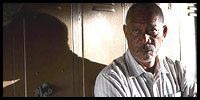 It is a quiet, rich character study of insightful, nod-inducing observations. It is impassioned in the utmost seriousness and detail with which it treats boxing and the arduous training that goes into it. It is profound in its smallest details—Maggie's silently warm encounter at a gas station with a child and her dog; Maggie's one-on-one talk with humble boxing club owner Eddie Scrap-Iron Dupris (Morgan Freeman) as he talks to her about how he was blinded in one eye during his own boxing days; the way in which Maggie generously buys her trailer-park-living, on-welfare mother a house with the money she's earned, only to be made to feel guilty and treated with disrespect and mocking—some of which don't gather meaning until the end has arrived and others that capture with blinding, hurtful honesty how difficult life can be. These, and countless others, are not stock scenes from a hundred different movies or cheap retreads of the "Rocky" series, but bristling with immediacy and authentic, fresh sensibilities.
It is a quiet, rich character study of insightful, nod-inducing observations. It is impassioned in the utmost seriousness and detail with which it treats boxing and the arduous training that goes into it. It is profound in its smallest details—Maggie's silently warm encounter at a gas station with a child and her dog; Maggie's one-on-one talk with humble boxing club owner Eddie Scrap-Iron Dupris (Morgan Freeman) as he talks to her about how he was blinded in one eye during his own boxing days; the way in which Maggie generously buys her trailer-park-living, on-welfare mother a house with the money she's earned, only to be made to feel guilty and treated with disrespect and mocking—some of which don't gather meaning until the end has arrived and others that capture with blinding, hurtful honesty how difficult life can be. These, and countless others, are not stock scenes from a hundred different movies or cheap retreads of the "Rocky" series, but bristling with immediacy and authentic, fresh sensibilities.
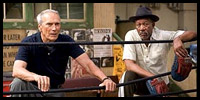 Finally, "Million Dollar Baby" is absolutely riveting entertainment, the strength and tightness of its screenplay and the mesmerizing performances of its cast all that is needed to soak the viewer into the world of Frankie, Maggie, and Eddie. Writer Paul Haggis does not allow a single action or word to be wasted, and, if anything, he and director Clint Eastwood might have benefited had they also included some scene transitions from boxing match to boxing match so as to widen the scope and more seamlessly travel with its characters from one country to the next. Told in narration by Morgan Freeman (2004's "The Big Bounce"), whose fascinating deep voice could make reading a restaurant menu to a stuffed patron enticing, "Million Dollar Baby" also elicits a novelistic feel that further draws one into the characters' backgrounds and story developments. The film is almost like a great book you don't want to stop turning the pages on.
Finally, "Million Dollar Baby" is absolutely riveting entertainment, the strength and tightness of its screenplay and the mesmerizing performances of its cast all that is needed to soak the viewer into the world of Frankie, Maggie, and Eddie. Writer Paul Haggis does not allow a single action or word to be wasted, and, if anything, he and director Clint Eastwood might have benefited had they also included some scene transitions from boxing match to boxing match so as to widen the scope and more seamlessly travel with its characters from one country to the next. Told in narration by Morgan Freeman (2004's "The Big Bounce"), whose fascinating deep voice could make reading a restaurant menu to a stuffed patron enticing, "Million Dollar Baby" also elicits a novelistic feel that further draws one into the characters' backgrounds and story developments. The film is almost like a great book you don't want to stop turning the pages on.
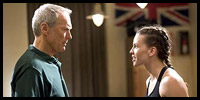 As Frankie Dunn, Clint Eastwood (2002's "Blood Work") hasn't been this emotionally stirring and tender in a role in years. With just an expression on his face, Eastwood is able to open up the book on Frankie's life and tell the viewer everything they need to know before he has even spoken. He shares crackerjack chemistry with Hilary Swank (2002's "Insomnia") that is much like a father-daughter relationship, with all of the ups and downs that go with such a familial bond. Swank is a physically convincing force as a trained boxer, but it is the brave, eager-to-please goodness in Maggie's heart that the actress even more brilliantly portrays. Revolving around the two leads are a flurry of effortless supporting performances, particularly Morgan Freeman's meaty, sympathetic turn as Eddie, and Margo Martindale (2002's "The Hours"), subtly vicious and unforgettable as Maggie's uncaring, greedy mother.
As Frankie Dunn, Clint Eastwood (2002's "Blood Work") hasn't been this emotionally stirring and tender in a role in years. With just an expression on his face, Eastwood is able to open up the book on Frankie's life and tell the viewer everything they need to know before he has even spoken. He shares crackerjack chemistry with Hilary Swank (2002's "Insomnia") that is much like a father-daughter relationship, with all of the ups and downs that go with such a familial bond. Swank is a physically convincing force as a trained boxer, but it is the brave, eager-to-please goodness in Maggie's heart that the actress even more brilliantly portrays. Revolving around the two leads are a flurry of effortless supporting performances, particularly Morgan Freeman's meaty, sympathetic turn as Eddie, and Margo Martindale (2002's "The Hours"), subtly vicious and unforgettable as Maggie's uncaring, greedy mother.
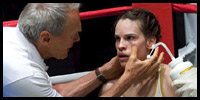 "Million Dollar Baby" is a wonderfully welcome surprise, a film that, like 2004's "Sideways," seemingly comes out of nowhere and blindsides you with its invigorating throwback to the days of non-flashy, vastly poignant character pieces, the kind that have become nearly extinct in today's cinematic landscape. If the eyes are the window to the soul, then "Million Dollar Baby," specializing in crucial close-ups that speak louder than words, is one of the more humane and thoughtful films of the year, a movie that takes a formulaic blueprint, tramples it to the floor, and comes up with something altogether more penetrating, touching, and real.
"Million Dollar Baby" is a wonderfully welcome surprise, a film that, like 2004's "Sideways," seemingly comes out of nowhere and blindsides you with its invigorating throwback to the days of non-flashy, vastly poignant character pieces, the kind that have become nearly extinct in today's cinematic landscape. If the eyes are the window to the soul, then "Million Dollar Baby," specializing in crucial close-ups that speak louder than words, is one of the more humane and thoughtful films of the year, a movie that takes a formulaic blueprint, tramples it to the floor, and comes up with something altogether more penetrating, touching, and real.
|
© 2004 by Dustin Putman |














